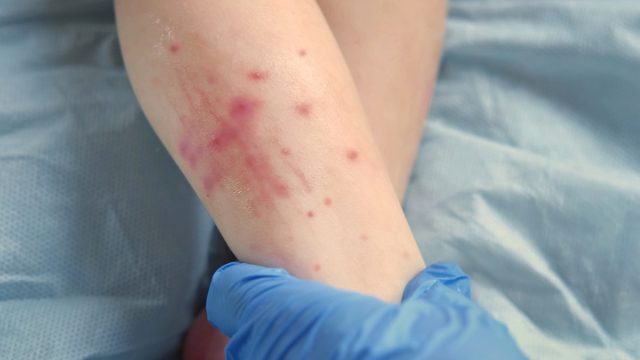CDC Issues New Warning to “Stay Alert” Amid Rising Measles Cases

Respiratory illness has been wreaking havoc on the U.S. this winter, which is nothing new. But it’s not just the flu, COVID-19, and RSV you need to be worried about right now. The Centers for Disease Control and Prevention (CDC) just issued a new warning about the recent rise of another very contagious virus that has technically been eliminated from the country: measles.
RELATED: Measles Now Spreading in 4 States: “A Relentlessly Increasing Threat.”
While measles was declared eliminated in the U.S. in 2000, it can still cause pockets of small outbreaks throughout the nation, according to the CDC. And in a new update posted Jan. 25, the agency is now warning healthcare providers to “stay alert” amid rising measles cases in the country.
The CDC stated that it had been notified of 23 confirmed U.S. cases of measles between Dec. 1, 2023 and Jan. 24, 2024. This includes seven tracked cases of measles from international travelers, and two nationwide outbreaks with more than five cases each.
“Most of these cases were among children and adolescents who had not received a measles-containing vaccine (MMR or MMRV), even if age eligible,” the agency added.
Recent measles outbreaks in the U.S. have been seen in Philadelphia and Washington state, USA Today reported. There have also been separate cases reported in Georgia and New Jersey, as well as documented measles exposures at two international airports in the Washington, D.C. area.
Michael Osterholm, PhD, director of the University of Minnesota’s Center for Infectious Disease Research and Policy, told the newspaper that the U.S. is at a “canary in the coal mine” moment in terms of rising measles cases.
“We’re going to start seeing more and more of these outbreaks,” Osterholm told USA Today. “We’re going to see more kids seriously ill, hospitalized and even die. And what’s so tragic about this, these are all preventable.”
RELATED: 4 New Vaccines You Need This Year, CDC Says in New Warning.
According to the CDC, most measles cases start with unvaccinated or under-vaccinated U.S. residents who travel internationally, then come back and spread the disease to others who are not vaccinated.
“The increased number of measles importations seen in recent weeks is reflective of a rise in global measles cases and a growing global threat from the disease,” the agency warned.
Measles is a highly contagious and serious illness. The CDC says that about 1 in 5 unvaccinated people in the U.S. who catch the virus will need to be hospitalized, and nearly 1 to 3 of every 1,000 children who become infected will eventually die from respiratory and neurologic complications.
The agency is asking healthcare providers to “be on alert” for patients who have a febrile rash illness and symptoms consistent with measles. These may include high fever, cough, runny nose, and watery eyes, which usually appear seven to 14 day after contact with the virus. The notorious measles rash typically shows up three to five days after the first symptoms.
“Call your healthcare provider immediately if you think you or your child have been exposed to measles,” the CDC advises.
The best way to prevent agains measles is vaccination. If you’re unsure whether you’ve been vaccinated, the CDC says there is “no harm in getting another dose” of the measles-mumps-rubella (MMR) vaccine.
Best Life offers the most up-to-date information from top experts, new research, and health agencies, but our content is not meant to be a substitute for professional guidance. When it comes to the medication you’re taking or any other health questions you have, always consult your healthcare provider directly.
- Source: CDC: Global Measles Outbreaks
- Source: CDC: Stay Alert for Measles Cases
- Source: CDC: Measles Complications
- Source: CDC: Measles Signs and Symptoms